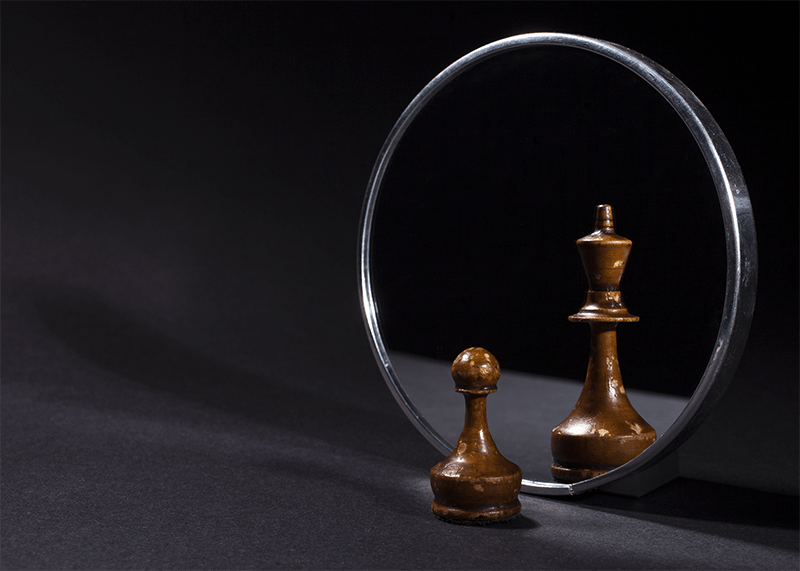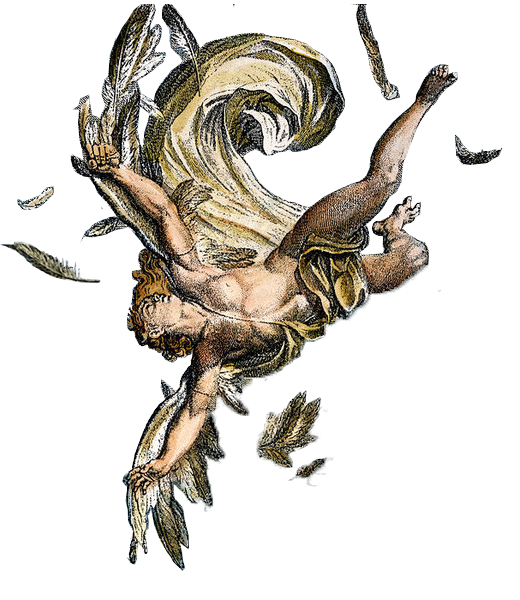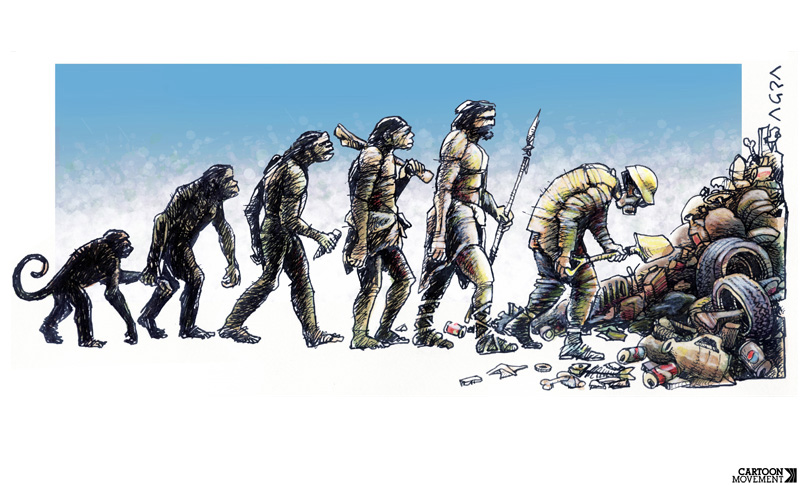Hubris is a Greek word that originally meant defiance of the gods, nearly always resulting in divine retribution, called Nemesis. Its modern meaning is: extreme arrogance, a combination of foolish pride and dangerous self-confidence. It aptly describes mankind's attitude towards the natural world.
Heading for a fall
We humans have always had a hugely inflated opinion of ourselves. Our ability to outsmart other animals made us believe that we were unique, superior to all others beings, not bound by the laws of nature but free to do anything we wanted. We imagined that we were supernatural, the center of the universe, pinnacle of creation, darlings of our imagined gods, destined for eternal life, partly divine and sometimes even entirely so.
This delusion of grandeur blinded us to the grave errors that marked our reign, the worst - and now seemingly fatal - error being our disregard for nature. We knew little about it, yet assumed in our ignorance that it was inferior to us, a wild and primitive place, devoid of law and order, without any intrinsic value, merely created for our convenience, so that we could use and abuse it as much as we pleased.
We could not have been more wrong.
Perhaps this error was forgivable when we knew no better, but that excuse was removed by Darwin's Origin of Species. That most important of books, unveiling the deepest mysteries of life, should have opened our eyes and minds. It should have humbled us, made us realize how insignificant we really are, not masters of nature, but simply pawns in it, just another species, albeit a very cunning one.
Ten thousand years ago, before humanity started to interfere, this planet had reached a stage of near perfection. It was a paradise, a single oasis of life in an otherwise desolate and barren galaxy. For billions of years evolution had performed its miracles, populating the world with ever growing numbers of species, millions of them, existing side by side in harmony in a superbly balanced, completely sustainable cycle of life. A true paradise, although it also had its dark and gruesome places, where the struggle for survival could be very hard indeed, but that was exactly the essence of life's success. No pain, no gain. Survival of the fittest benefited every species, giving even the tiniest, most fragile lifeforms the tools to survive. It worked like magic, preventing the world from being dominated by the strongest and the fiercest, because they, like their prey, also had to struggle to survive. It was a balancing act so unimaginably superior to anything that we could achieve that even now, with all our scientific knowledge of the workings of evolution, few people seem able to grasp its immense scale and complexity and many still believe, foolishly and against all evidence, that we can do better.
Nature has produced millions of species, while we, in spite of all the boasting of our genetic alchemists, have not produced a single one. We cannot even create a limb or an organ. We are also incapable of balancing even a single species, our own.
Nature is so superior to all our artifice that it is ludicrous to even compare them.
Little wonder, therefore, that life before civilization was also good for humans, roaming through a world teeming with wildlife and edible plants. Modern research has shown that hunter-gatherers had much more leisure time than we have now. Their diets were much more varied and therefore healthier than ours. They were free and independent. Although, being human, they did have their share of armed conflict, they had no slavery, no famines, no poverty. Those ills were caused by civilization.
It is patently obvious that the further we stray from the natural order of things, the worse our problems become.
In spite of mounting environmental disasters, all caused by our incompetence, we cling to the belief that we can somehow turn things around by doing more of the same. Blinded by our baseless self-adoration we refuse to change our ways.
Many of our boasts, when examined more closely, turn out to be hollow.
Especially our favorite boast that we are steadily progressing to ever greater heights is nonsense, flatly contradicted by the facts. We are steadily descending into an abyss of our own making by persistently violating the laws of nature.
A brief overview of our so-called progress will show that in reality we have progressed very little, environmentally, politically, socially, spiritually, intellectually, morally or physically. The only fields in which we have truly excelled are science and technology but even those positives have been turned into negatives by our misuse of them.
Environmentally
we could hardly have done worse. This website offers ample proof of that. We already harmed our environment in prehistoric times, but the damage only got worse as we became more civilized. Our devastating impact is now beginning to destroy us.
Politically
we have made bitterly little progress. True civilization should have led to unity, a global governance that would enable us to deal with global problems swiftly and effectively. Instead we are split into about 200 different countries, all pursuing their own ends, pulling in different directions, using different languages, adoring different idols, all more or less hostile to one another, wasting colossal resources on weaponry. Democracy seems to be the best we can do, but it's an antiquated and badly flawed system that was conceived more than 2,000 years ago for a much simpler society. It favors mediocrity, certainly does not bring forth the best and the brightest, but rather the craftiest, smart-alecks who are able to manipulate the sentiments of the masses but lack the qualities of good leaders. Democracy is also being weakened more and more by the influence of small pressure groups that manage to advance their own selfish interests at the expense of the rest.
Physically
we are declining dramatically. We are often told that we are living longer and healthier lives than ever before, but that is only very partially true. In the past people also lived to a ripe old age. Average life expectancy was low only because of high child mortality, which was certainly tragic at a personal level but benefited humanity as a species, because it prevented overpopulation and ensured that only the strong survived, who could then look forward to a healthy life, in many respects healthier than ours. That also makes perfect sense, given the fact that effective medicine did not emerge until the end of the 19th century and health care only appeared in the middle of the 20th century. Before that people simply had to be healthy to survive.
Now the indiscriminate use of health care and medicine is causing rampant overpopulation and severe reductions in fitness (because the unfit are surviving in ever greater numbers). In 2016 the USA spent $3.35 trillion on health care; not exactly a sign of a hale and hearty population. Some other figures from the US:
About 60% of the people are taking prescription drugs
About 40% of men and women will be diagnosed with cancer
About 38% of adults are obese
Socially
we may have advanced but not much. As hunter-gatherers we led easy, relatively carefree lives, surrounded by the abundance of unspoilt nature, in which we were undisputed masters thanks to our intelligence and skills. Civilization brought many ills, which we prefer to ignore. Agriculture harmed the environment from the beginning, sharply reduced the healthy variety of food that people ate and led to widespread famines when crops failed. Worse still, it also brought the need for cheap labor, leading to different forms of slavery, which created a split in society that has not been healed to this day. Indeed, the division between rich and poor is as bad as ever, and getting worse. According to figures from Oxfam the 42 richest people on the planet own just as much as half of the remaining population, or about 3,700,000,000 people. That is criminally insane.
But even in rich countries, the healthier, happier lives we brag about so much, are not quite the norm. Some more numbers from the USA:
About 50% of marriages end in divorce
About 13% of adults are taking antidepressants
About 12% have been maltreated as children
Spiritually
we have not advanced much beyond the superstitions of the distant past. Billions of people, deaf and blind to the discoveries of science, still believe in religious mumbo-jumbo and stand ready to kill anyone who doesn’t. Every day brings new atrocities committed in the name of religions. On the other hand those who have weaned themselves of their delusional faiths have found nothing to replace them, and simply wallow in their vices.
Culturally
we have reached a new low. There isn't a single living artist who can hold a candle to the greats from the past, whether in literature, music or the visual arts, which makes it little wonder that ordinary people can't be bothered with culture anymore.
Materially
mankind has indeed made enormous progress. We are very good at building things. But the cost is prohibitive. In nature everything is balanced and sustainable. What is taken, is also returned, in an almost endless process of recycling. We, on the other hand, take a lot but return very little. When making things, we exploit, exhaust, deplete, destroy, poison and pollute. Our ways are unsustainable and therefore fatally flawed.
Morally
we have also made woefully little progress. No period in human history produced more man-made suffering than the 20th century. World wars, genocides, weapons of mass destruction and some of the worst ever famines brought agonizing death to more than a 100 million people, wounding and crippling many more. The development of ever more destructive weapons continues to this day. Our treatment of the environment is deeply immoral, both towards future generations but also towards nature and even life itself. We have turned this erstwhile paradise into a hellhole, not only for many of our own species but also for other animals; in the wild they are being driven into extinction, domesticated they are treated with unspeakable cruelty, denied even the most basic features of life, crammed into confined spaces, without ever experiencing daylight, fresh air or just a few yards to move. This maltreatment of our fellow creatures, to whom we owe a duty of kinship, is perhaps the least forgivable of our crimes.
"Pride comes from not knowing yourself and the world. The older you grow, and the more you see, the less reason you will find for being proud. Ignorance and inexperience are the pedestal of pride; once the pedestal is removed – pride will soon come down."
J.C. Ryle
"Our environmental problems originate in the hubris of imagining ourselves as the central nervous system or the brain of nature. We're not the brain, we are a cancer on nature. "
David Foreman
"Whatever befalls the earth, befalls the people of the earth. Man did not weave the web of life; he is merely a strand in it."
Chief Seattle




